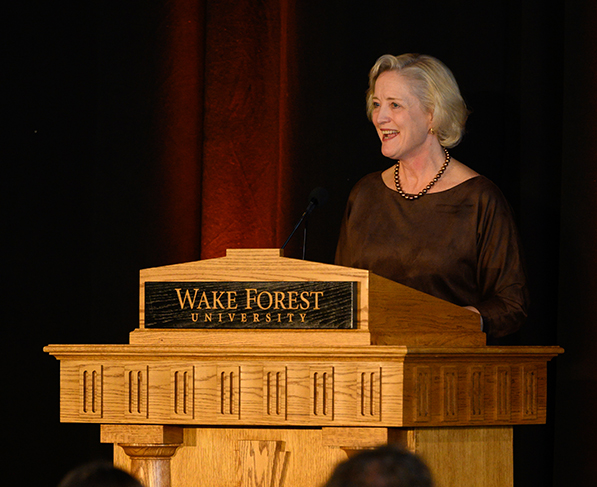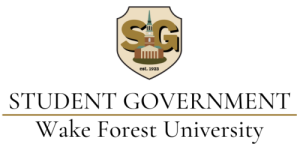Wente delivers annual presidential address
The address recounted Wente’s first year and detailed Wente’s vision for the university’s future

President Wente addresses the university community from the fourth floor of the Sutton Center.
November 30, 2022
In her second annual address at Wake Forest University after a year-and-a-half in office as president, Dr. Susan Wente reviewed her administration’s accomplishments thus far and offered a blueprint for the university moving forward in its third century of existence.
The address and campus community reception was hosted on Thursday, Nov. 17 on the fourth floor of the Sutton Center. The program was also live-streamed on the President’s website.
When outlining the core commitment to molding individuals into an outstanding institution, Wente proudly declared the increase of diversity and academic excellence in the class of 2026, the renovation of campus spaces and, most importantly, the doubling of the “For Humanity” scholarship initiative to $50 million.
Faculty expressed anticipation of hearing the president’s plan for the years to come.
“I wanted to hear the vision of Dr. Wente about what’s a priority,” Jack Dostal, associate teaching professor in the Department of Physics, said. “In science, it is important to know where research fits into undergraduate education. So it is helpful to know what’s being valued.”
After an a cappella performance of “Dear Old Wake Forest” by the Demon Divas, Tracey L. Banks, associate professor of legal analysis, writing and research, outlined some key achievements during Wente’s first year as the president, such as radical collaboration and the strategic framework.
When Wente took the stage, she conveyed her condolences for the recent violence and loss of life at the University of Virginia. Together, Wente and the audience took a moment of silent tribute.
Wente started her address by recounting moments when she embraced campus traditions with students, such as her first Hit the Bricks, LoveFeast, bowl game win and her first commencement.
“These moments make Wake Forest truly feel like home,” Wente said. “They help us navigate times of change and transition for the university.”
During the past year under Wente’s leadership, Wake Forest navigated through a COVID-19 resurgence, the Weaver Fertilizer Plant fire, a winter storm and other challenges. It was a time to test the president’s resilience and commitment, but facing the obstacles collectively, Wente discovered the culture and people of what she called, “a great university.”
From there, Wente posed two critical guiding questions of her address, “who are we now?” and “who will we become?”
To answer the question of “who we are now?”, Wente stresses the role of a great university in being a catalyst of good. The enzyme analogy stems from Wente’s experience as a biomedical scientist, and refers to the expectation that Wake Forest should foster access, opportunity, learning and innovation.
Troy Burnett, the associate director of undergraduate Integrative Student Services at the School of Business, has been in his position for one year. Wente’s vision of Wake Forest’s future granted him a sense of belonging.
“Knowing that I am a part of a community gave me the purpose of what I am working here for,” Burnett said. “We are all working together for one cause. So why not come together and make a bigger impact?”
Not everyone was excited about Wente’s message though.
“Based on what [Wente] said, it seems like she wants to make a lot of changes while not disrupting the previous tradition,” Tyler Favale, a study abroad advisor who joined Wake Forest center for global program and study in 2022, said. “So I don’t really know what to do with that, in all honesty, especially being new.”
Despite the uncertainty, Favale agreed that going forward in his position, he would continue to focus on what is best for both domestic and international student populations alike.
Wente closed her address with a global vision of Pro Humanitate.
“In giving input into the thematic goals, the Core Planning Team was driven by the desire to identify a distinctive value proposition — our compelling why — which I fully endorse: Wake Forest will embody Pro Humanitate at home and in the world,” Wente said.
Michael Kamtman, assistant teaching professor in the Department of Theatre and Dance, pictured his version of Wake Forest after hearing the address.
“If we were to come back after we are retired and see new buildings and new programs emerge as the ongoing evolution of a university, it would be fascinating to see how they reflect the seeds that have been planted,” Kamtman said.











